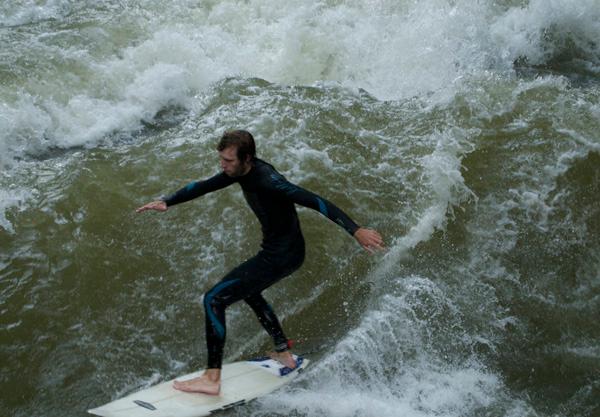(Photo: Tom Dreisbach)
By Tom Dreisbach
Munich probably doesn’t come to mind when you think of surfing. The German city is more than 500 miles away from the closest surfable beach. But people are surfing there. They are not riding an ocean wave. They are surfing on the river.
Standing on the banks of the Eisbach River in Munich’s English Garden, about a 10-minute walk from the subway, you can see a wave of green water, maybe three feet high, that is constantly cresting. About a dozen surfers in wetsuits are taking turns riding and doing tricks for an audience of locals and tourists. Many are crowded onto a bridge right above the wave, where you can probably get the best view of the surfing.
“I’m so jealous. The waves here are better than they are back home,” said Eddie Rosenberg, one of the tourists on the bridge. He is a student at Florida State University.
Concrete blocks beneath the surface of the river create the wave. Local surfers have modified and improved the flow by installing wooden planks. People have been surfing here for close to 40 years, but it was only last year that the city officially legalized river surfing. Now an estimated 500 local surfers frequent the Eisbach. Just last week, Munich held its second annual Surf Festival. It had a decidedly German flavor — wooden boards carved in the Black Forest, beer-inspired t-shirts, and re-imagined lederhosen. They look like lederhosen, but they’re board shorts so you can swim in them.
Still, for outsiders, it remains an oddity. How does a culture of surfing thrive so far from the beach?
Sebastian Steudtner, a professional surfer from Nuremberg who won Billabong’s big wave award for his ride on a 66-foot wave in Maui, tried to explain.
“Surfing is a lifestyle. Anywhere you go in the world there are surfing stores with surf shorts and t-shirts. But the actual act of surfing wasn’t possible. But those stationary waves or river waves make it possible.”
When he was 16, Steudtner moved to Hawaii to learn surfing. The next generation, though, might not have to make such a drastic move. His hometown of Nuremberg plans to build its own river wave next year.
“I just asked the guys, I really want to go down there and surf. But no one’s too cool with letting me use their board. I’m wearing my bathing suit right now. I want to go in so bad.”
Down below, Phillipp Köstring got out of the river and took off his wetsuit.
“Of course it’s not as nice as the ocean. It’s more like a surfing simulator,” Köstring said. “But it has its own charm.” For one thing, the wave is in the middle of the city, so Köstring can leave work and be surfing a few minutes later.
